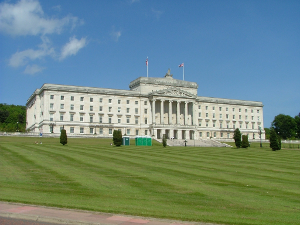 On Tuesday, 29 May, an early years event is to be held at Stormont — Northern Ireland’s Parliament. Entitled ‘Connecting knowledge on how early-life experiences impact on later-life outcomes with a programme of action’, and hosted by the Public Health Agency and Health & Social Care Board, the event was specifically designed to feature excerpts from our film, the connected baby. I will be speaking, along with my colleague from the Scottish Violence Reduction Unit, Karyn McCluskey, to a gathering of politicians from the Parliament, as well as a range of key early years professionals.
On Tuesday, 29 May, an early years event is to be held at Stormont — Northern Ireland’s Parliament. Entitled ‘Connecting knowledge on how early-life experiences impact on later-life outcomes with a programme of action’, and hosted by the Public Health Agency and Health & Social Care Board, the event was specifically designed to feature excerpts from our film, the connected baby. I will be speaking, along with my colleague from the Scottish Violence Reduction Unit, Karyn McCluskey, to a gathering of politicians from the Parliament, as well as a range of key early years professionals.
I find myself deeply moved by this event. Stormont is the site of peace talks. Those peace talks have gripped the world. Stormont has become a place of hope, a place of resolution, a place of armistice. The very word ‘Stormont’ now proclaims peace. Those two syllables promise us the possibility that connection always has the potential to follow disconnection.
We normally think of peace building as a societal process. And certainly it is. The events in Northern Ireland over the last decade have taught us that. But the insight I hope to offer on Tuesday is that we can also wire individuals for peace. Yes, ‘wire people for peace’! Neuroscience and its companions are teaching us how to do that – and revealing that the very best time to do that is during the early years. I think it immensely empowering to realize that we can literally wire our children for peace.
I hope that idea will be helpful for this gathering. Every time I am in Northern Ireland I am impressed by the strength of their commitment to the early years movement, by the energy of practitioners and leaders alike. I want to be sure that, for this unusual event, I am offering them something creative, something that will keep thatenergy fully engaged. Wiring people for peace is an energetic idea!
Let me make very clear, though, that it is not my own. I am lifting verbatim from the work of Marcy Axness, who has just this year published her book Parenting for Peace. This is such a thoughtful, creative volume. In it, Axness has combed all the psychological, neuroscientific, and biological literatures to glean from them what it is we would need to do to raise what she calls Generation Peace. Think of that as an explicit societal goal: to raise a generation of peacemakers!
What better place to explore that vision, than Stormont?

Here are a few quotes from Axness’ book that I aim to include within my presentation:
“Heartened by the promise of simple principles backed by leading-edge research, parents can feel confident in their ability to raise children who are ‘hardwired for peace’. (p.2)
This [scientific information] offers us one kind of chance – perhaps the best kind of chance – to heal our global family. This is an invitation to a new way of thinking about children and about ourselves. (pg. 3)
Our children’s pliable neurons carry within them all humanity’s hopes. (pg. 403, re-quoted from the work of Lewis, et al, ‘A General Theory of Love’)
Tuesday is, for me, a landmark moment. I always feel that a threshold has been crossed when a Parliament hosts an event on babies. Babies! It means that those in power have begun to realize just how crucial our relationships with our children are, not only for their health and happiness, but even more so, for our own. The emotional capacities of tomorrow’s adults are being created in parents’ arms today.
Tuesday is extra special. It is a landmark moment. The event at Stormont lets us see the early years movement as a next step in the Peace Process. This is deeply humbling. I know that Marcy Axness has been immensely pleased to learn that the language of her book is helping to spread this message. And I am honoured that myself, my team, and our film should have the opportunity to play a part as well. Life is astounding.
